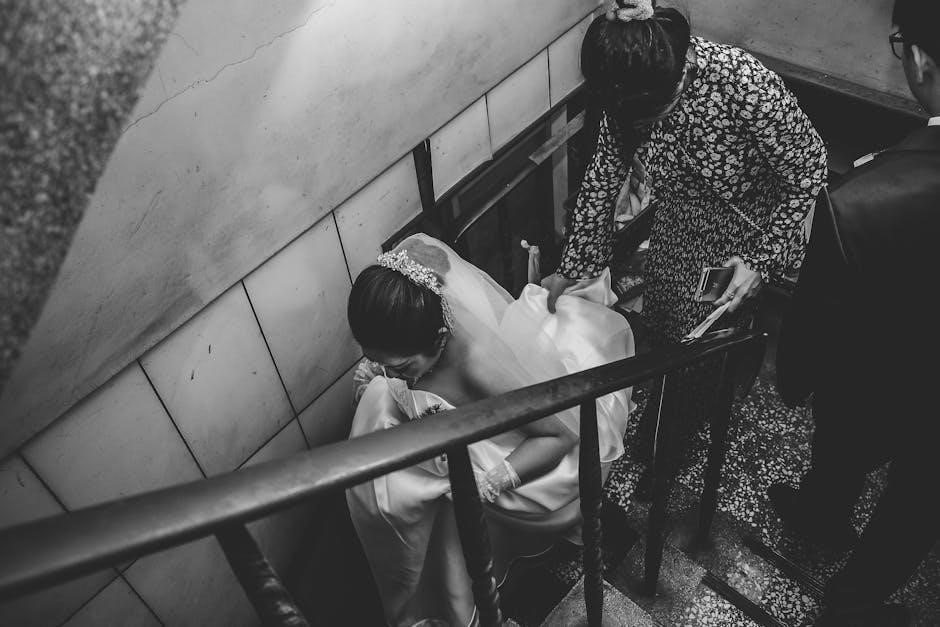A Catholic marriage preparation course is a comprehensive program blending theology, practical skills, and community support. It guides couples to build a strong, faith-centered marriage, addressing topics like NFP, communication, and sacramental love.
1.1 What is Catholic Marriage Preparation?
Catholic Marriage Preparation is a structured process designed to help couples deepen their faith, understand the sacrament of marriage, and build a strong foundation for their relationship. It combines theological teachings with practical skills, ensuring couples are spiritually and emotionally prepared for lifelong commitment. The process typically involves guidance from parish ministers, participation in marriage preparation courses, and reflection on key Church doctrines. Topics covered include the theology of marriage, Natural Family Planning (NFP), communication skills, and financial planning. The goal is to foster a deeper understanding of sacramental marriage and equip couples with tools for navigating life’s challenges together. By integrating faith and practical wisdom, Catholic Marriage Preparation aims to strengthen couples’ relationships and align them with the Church’s teachings on love, fidelity, and family life.
1.2 Importance of Marriage Preparation in the Catholic Church
Marriage preparation holds a vital role in the Catholic Church, as it ensures couples are spiritually, emotionally, and intellectually ready for the lifelong commitment of sacramental marriage. The Church views marriage as a sacred vocation, and preparation helps couples understand its divine purpose and responsibilities. Through this process, couples deepen their faith, fostering a stronger relationship with God and each other. Marriage preparation also emphasizes the importance of communication, mutual respect, and fidelity, which are essential for a thriving marriage. Additionally, it provides couples with practical tools to navigate life’s challenges, aligning their relationship with the Church’s teachings on love, family, and sacramental life. By participating in marriage preparation, couples not only honor the Church’s traditions but also build a solid foundation for a faith-centered and enduring union.
The Process of Catholic Marriage Preparation
The Catholic marriage preparation process involves spiritual guidance, practical workshops, and personalized counseling. Couples engage in theological discussions, assess their readiness, and complete necessary documentation under parish supervision to ensure a sacramental union.
2.1 Overview of the Marriage Preparation Process
The Catholic marriage preparation process is a structured journey designed to guide couples toward a sacramental union. It begins with initial meetings with parish priests or designated ministers to discuss intentions and readiness. Couples then participate in a series of sessions, which may include group workshops, individual counseling, and online courses. These sessions cover essential topics such as the theology of marriage, communication skills, and Natural Family Planning (NFP). Additionally, couples are required to complete a pre-marital inventory to assess their compatibility and understanding of marriage. The process also involves obtaining necessary documents, such as baptismal certificates and letters of freedom to marry. Throughout this journey, the parish community provides support, fostering spiritual growth and practical preparedness for a lifelong commitment. The goal is to ensure couples are well-equipped to embrace the sacrament of marriage with faith, understanding, and mutual dedication.
2.2 Steps Involved in Catholic Marriage Preparation
The Catholic marriage preparation process involves several structured steps to ensure couples are spiritually and practically prepared. It begins with an initial meeting with the parish priest or designated minister to discuss the couple’s intentions and readiness for marriage. Couples are then enrolled in a marriage preparation program, which may include online courses, group workshops, or individual counseling sessions. A key component is the completion of a pre-marital inventory, such as the FOCCUS or PREPARE assessment, to evaluate compatibility and understanding of marriage. Additionally, couples must gather necessary documents, including baptismal certificates, confirmation records, and affidavits of freedom to marry. Attendance at a marriage preparation retreat or weekend is often required, focusing on communication, conflict resolution, and sacramental understanding. Finally, a rehearsal and a pre-marital interview with the priest ensure all aspects are addressed before the wedding ceremony. Each step is designed to foster a deeper understanding of the sacrament and lifelong commitment.
2.3 Role of the Parish in Marriage Preparation
The parish plays a vital role in Catholic marriage preparation by providing spiritual guidance and practical resources. Couples typically begin by contacting their local parish, where they meet with a priest or designated marriage preparation minister. The parish coordinates the preparation process, ensuring couples complete all required steps, such as pre-marital counseling, inventories, and documentation. Many parishes offer marriage preparation courses, either in-person or online, which cover essential topics like sacramental marriage, communication, and family planning. Additionally, the parish often hosts retreats or workshops to deepen couples’ understanding of the sacrament. The parish also verifies the freedom of both individuals to marry and collects necessary documents, such as baptismal certificates and affidavits. Finally, the parish conducts the wedding rehearsal and ceremony, ensuring the couple is well-prepared for their lifelong commitment. Through these efforts, the parish supports couples in building a strong, faith-centered foundation for their marriage.

Key Components of a Catholic Marriage Preparation Course
A Catholic marriage preparation course covers theology of marriage, natural family planning, communication skills, sacramental understanding, and family goals, providing a holistic foundation for a faith-centered and successful marriage.
3.1 Theology of Marriage and Matrimonial Love
Theology of marriage explores the sacred nature of matrimony as a union between a man and a woman, reflecting Christ’s love for His Church. It emphasizes marriage as a sacrament, a lifelong covenant rooted in fidelity, mutual respect, and self-giving love. The course delves into biblical teachings, such as Ephesians 5:25-33, which highlights the spousal love of Christ and the Church, serving as a model for marital relationships. Participants learn about the indissolubility of marriage, the importance of marital chastity, and the role of grace in sustaining the union. This component also addresses the purpose of marriage, including the procreation and education of children, and the mutual sanctification of spouses. By understanding the theological foundations, couples are equipped to view their marriage as a vocation and a path to holiness.
3.2 Natural Family Planning (NFP) and Church Teachings
Natural Family Planning (NFP) is a key component of Catholic marriage preparation, emphasizing the Church’s teachings on human sexuality, marriage, and responsible parenthood. NFP methods, based on observing and interpreting natural fertility cycles, align with Catholic doctrine by respecting the dignity of life and marital love. The Church teaches that NFP promotes self-giving love, mutual respect, and communication between spouses. It encourages couples to prayerfully discern their family planning decisions, considering their financial, emotional, and spiritual readiness for children. Unlike artificial contraception, NFP fosters a deeper understanding of the marital covenant and the sacredness of human life. Through NFP, couples learn to appreciate the beauty of God’s design for marriage and family, fostering a culture of life and love. This section of the course helps couples embrace NFP as a way to live out their faith and build a harmonious, God-centered marriage.
3.3 Communication and Conflict Resolution Skills
Effective communication and conflict resolution are essential for a thriving Catholic marriage. Marriage preparation courses emphasize the importance of open, honest, and respectful dialogue, encouraging couples to express their thoughts, feelings, and needs clearly. These skills help build trust, understanding, and intimacy, fostering a strong emotional connection. Conflict resolution techniques are also taught, focusing on how to address disagreements constructively, without resentment or harm. Couples learn to approach challenges with empathy, patience, and a willingness to compromise, reflecting the values of Christ-like love and forgiveness. By mastering these skills, couples can navigate life’s challenges together, strengthening their relationship and deepening their commitment to one another. These practical tools, rooted in Catholic teachings, empower couples to create a supportive and loving environment, essential for a sacramental marriage that honors God and each other;
3.4 Understanding Sacramental Marriage
Understanding sacramental marriage is central to Catholic marriage preparation, as it emphasizes the sacred and lifelong nature of the union. The Church teaches that marriage is a covenant between a man and a woman, ordained by God, and a reflection of Christ’s love for His Church. Couples learn that sacramental marriage is not just a legal or emotional bond but a spiritual one, rooted in faith and commitment. The preparation course highlights the teachings of Scripture, such as Ephesians 5:26-27, which illustrate the spousal love of Christ for His Church. Participants explore the sanctity of marriage, its indissolubility, and its role as a means of sanctification. The course also emphasizes the importance of receptions of the Holy Eucharist and the Rite of Marriage, ensuring couples understand the sacrament’s divine origin and purpose. This understanding deepens their appreciation for marriage as a holy institution and a living testimony to God’s love.

3.5 Family Goals and Financial Planning
Family goals and financial planning are essential components of Catholic marriage preparation, helping couples build a stable and harmonious life together. The course encourages couples to discuss and set shared goals for their future, including raising children, managing a household, and supporting each other’s personal and spiritual growth. Financial planning is also emphasized, with practical advice on budgeting, saving, and responsible money management. Couples learn how to align their financial decisions with their faith values, fostering a sense of unity and shared responsibility. The preparation process also addresses the importance of communication in handling financial challenges, ensuring that couples can navigate disagreements with empathy and understanding. By establishing clear goals and financial strategies, couples lay a strong foundation for their marriage, enabling them to prioritize their relationship and create a loving, stable home; This aspect of preparation helps couples approach married life with confidence and mutual support.

Benefits of a Catholic Marriage Preparation Course
A Catholic marriage preparation course fosters spiritual growth, strengthens faith, and equips couples with practical skills for a successful marriage, while also providing community support and a strong foundation for lifelong commitment.
4.1 Spiritual Growth and Faith Deepening
A Catholic marriage preparation course enriches couples’ spiritual lives, deepening their understanding of faith and its role in marriage. Through discussions on theology, sacraments, and prayer, participants grow closer to God and each other. The program emphasizes the sacred nature of marriage, encouraging couples to view their relationship as a vocation rooted in Christ’s love. By exploring biblical teachings and Church doctrine, couples strengthen their spiritual foundation, fostering a shared faith life. The course also encourages regular prayer and participation in the Eucharist, nurturing a deeper connection with God. This spiritual growth helps couples approach marriage with a renewed sense of purpose and commitment, guided by Catholic values. The program’s focus on faith deepening ensures that marriage is not only a earthly bond but also a sacramental union reflecting God’s love and plan for humanity.
4.2 Practical Skills for a Successful Marriage
Catholic marriage preparation courses equip couples with essential practical skills to navigate the challenges of married life. These include effective communication, conflict resolution, and empathy. Through interactive sessions, couples learn how to express emotions constructively and listen actively, fostering understanding and harmony. The program also emphasizes the importance of shared goals and collaboration, helping partners align their values and aspirations. Couples are encouraged to develop resilience and patience, recognizing that marriage requires effort and dedication. These skills are taught through real-life scenarios, group discussions, and personalized exercises, ensuring couples are well-prepared to handle life’s ups and downs together. By mastering these practical skills, couples build a strong, enduring foundation for their marriage, enabling them to grow together in love and unity. These tools not only enhance their relationship but also reflect the Catholic Church’s teachings on the sanctity and permanence of marriage.
4.3 Building a Strong Foundation for Marriage
Building a strong foundation for marriage is a cornerstone of Catholic marriage preparation. This process helps couples establish a deep understanding of their commitment to one another and to God. Through guided reflection, couples explore shared values, goals, and expectations, fostering unity and mutual respect. The program emphasizes the importance of fidelity, communication, and sacramental unity, ensuring couples are prepared to navigate life’s challenges together. Key aspects include understanding the sacrament of marriage as a covenant and a vocation, as well as fostering a deeper appreciation for the role of faith in their relationship. By addressing potential conflicts and encouraging open dialogue, the course helps couples create a resilient and loving partnership. This foundation is further strengthened by the Church’s teachings on the indissolubility of marriage and the unity of spouses as a domestic church. The preparation process equips couples with the tools and mindset to build a lifelong, Christ-centered marriage.
4.4 Community Support and Mentorship
Community support and mentorship play a vital role in Catholic marriage preparation, offering couples a network of guidance and encouragement. Many programs, such as the “Preparing Together” course, emphasize the importance of parish involvement, where couples can connect with experienced mentors who have navigated the challenges of married life. These mentors provide practical advice, share personal experiences, and help couples deepen their understanding of the sacrament of marriage. Additionally, group sessions and retreats foster camaraderie among engaged couples, creating a supportive environment for open discussion and mutual encouragement. The parish priest or designated marriage preparation minister often serves as a spiritual guide, helping couples align their relationship with the Church’s teachings. This collective support system not only strengthens the couple’s bond but also integrates them into the broader Catholic community, ensuring they feel accompanied on their journey toward matrimony and beyond. Such mentorship and community involvement are integral to fostering a lifelong commitment to faith and marriage.
Challenges and Considerations in Catholic Marriage Preparation
Catholic marriage preparation faces challenges like cohabitation, interfaith marriages, and the role of the marriage tribunal. Couples must also address emotional and spiritual readiness, ensuring alignment with Church teachings and values.
5.1 Cohabitation and Its Impact on Preparation
Cohabitation before marriage can present unique challenges in Catholic marriage preparation. Many couples believe living together strengthens their relationship, but it may complicate the preparation process. The Church encourages couples to understand the sacramental nature of marriage, emphasizing commitment and fidelity. Cohabitation often requires additional discernment and discussion with parish leaders to ensure alignment with Catholic teachings. This may prolong the preparation period as couples reflect on their attitudes toward marriage and intimacy. The Church’s stance on cohabitation is rooted in its teachings on the sanctity of marriage and the importance of forming a strong spiritual foundation; Couples in such situations are encouraged to engage deeply with the preparation process, including discussions about faith, values, and long-term goals. Ultimately, the Church seeks to support couples in building a marriage centered on Christ, even as they navigate modern societal norms and personal choices.
5.2 Interfaith Marriages and Their Special Requirements
Interfaith marriages involve unique challenges and require special attention during Catholic marriage preparation. Couples from different religious backgrounds must navigate theological differences while building a shared understanding of marriage. The Catholic Church encourages open dialogue and mutual respect between partners, emphasizing the importance of faith in the relationship. In such cases, the couple must meet with both the Catholic priest and the spiritual leader of the non-Catholic partner to ensure a harmonious union. The Church may require additional steps, such as a dispensation from the bishop, to bless the marriage. Additionally, couples are encouraged to discuss and agree on how faith will be lived out in their home, particularly regarding the upbringing of children. The Church’s goal is to support the couple in fostering a deeply spiritual and unified marriage, while respecting the beliefs of both partners. Interfaith marriages highlight the Church’s commitment to unity and compassion in diverse circumstances.
5.3 The Role of the Marriage Tribunal
The Marriage Tribunal plays a crucial role in the Catholic Church’s process of evaluating the validity of marriages, particularly in cases where annulments or dispensations are sought. As part of the Church’s canonical system, the Tribunal investigates whether a marriage meets the essential requirements for validity under Church law. This includes assessing factors such as free consent, mental capacity, and the absence of impediments. The Tribunal’s work is grounded in canon law and is conducted with the aim of upholding the sanctity and indissolubility of sacramental marriage. Couples may encounter the Marriage Tribunal during marriage preparation if there are canonical issues, such as a previous marriage or a lack of proper documentation. The Tribunal’s findings provide clarity and guidance, ensuring that all marriages within the Church are entered into with full understanding and fidelity. Its role is both judicial and pastoral, aiming to serve justice while supporting couples in their journey toward a valid and sacramental union.
5.4 Remote or Online Marriage Preparation

Remote or online marriage preparation has become an increasingly popular option for couples, especially in light of modern challenges and the need for flexibility. Many Catholic dioceses and organizations now offer online courses that provide a comprehensive preparation experience. These programs typically include interactive modules, video lessons, and downloadable resources that cover essential topics such as the theology of marriage, communication skills, and financial planning. Online preparation allows couples to complete the program at their own pace, making it ideal for those with busy schedules or living in different locations. Some programs, like the “Preparing Together” course, complement online learning with parish-based support, ensuring a balanced approach. While remote preparation offers convenience, it maintains the Church’s teachings and ensures couples are well-prepared for sacramental marriage. This modern approach reflects the Church’s adaptability in serving couples while upholding the integrity of its traditions and doctrines.